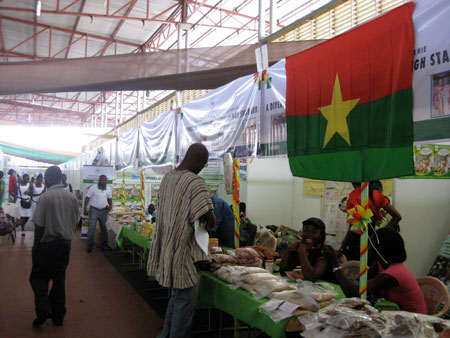The 30th World Food Day finds more hungry people on the planet than ever before. According to the Food and Agriculture Organization (FAO) of the United Nations 1 billion people live in chronic hunger. UN Secretary General Ban Ki-moon’s official message on this year’s theme “United against Hunger” reflects today’s global reality. “For many people, today is not World Food Day. It is another No Food Day.”
The future holds a seemingly unceasing series of challenges as food production will have to increase 70 percent by 2050 to feed a looming population of nine billion people. Here in Accra, Ghana, however, the mood is hopeful. The Honourable Kwesi Ahwoi, Minister of Food and Agriculture proclaimed that “a lot is happening here. The country is moving forward and we are not going back.”
Ghana is considered the gateway to Africa based on its strong agrarian roots and stable political environment. Agriculture is the dominant sector in Ghana’s economy. The sector plays a critical role in reducing poverty and achieving economic growth employing about 60% of the labor force and contributing about 40% to the Gross Domestic Product (GDP). It also accounts for over 57% of the country’s foreign exchange earnings.
This week at the 2nd National Farm and Agric Show in Accra (FAGRO) the suggestion that some parts of Africa might be turning the corner seems at least conceivable. At the show farmers, associations of farmers and fisherman, agribusinesses from all sectors, and NGO and governmental agricultural development organizations have come together to share Ideas, showcase and promote agriculture products and learn about improved modern and innovative methods of farming.
 Farmers at the World Food Day ceremonies and the farm and agric show are confident they are up to the task. A placard carried by a farmer in the audience said as much – Aid Cannot Feed Us For Life. Rather fair prices and ready markets for what we also produce. Talking with farmers and processors who produce everything from nutmeg and tilapia to pineapple juice and dehydrated oyster mushrooms confirmed the prevailing sentiment that farmers are eager to access new technologies and reach new markets.
Farmers at the World Food Day ceremonies and the farm and agric show are confident they are up to the task. A placard carried by a farmer in the audience said as much – Aid Cannot Feed Us For Life. Rather fair prices and ready markets for what we also produce. Talking with farmers and processors who produce everything from nutmeg and tilapia to pineapple juice and dehydrated oyster mushrooms confirmed the prevailing sentiment that farmers are eager to access new technologies and reach new markets.
Linking African producers to markets is not exactly a new idea. International aid and finance organizations have invested significant resources to provide technical assistance to help farmers use good agricultural practices and to shore up supply chains. ACDI/VOCA, for example, is improving Ghana’s agricultural sector by increasing competitiveness in domestic, regional and international markets through the USAID-funded Ghana Agricultural Development and Value Chain Enhancement (ADVANCE) program. Policies and programs like the USA’s African Growth and Opportunity Act (AGOA) offer incentives for Ghana and other African countries to continue their efforts to open their economies and build free markets.
Significant challenges remain of course if Ghana and other African countries are going to truly turn the corner on combating hunger and malnutrition at home while penetrating new markets on the continent and elsewhere on the globe.
Philip Abayori, Chairman of the FAGRO Advisory Board, explains that irrigation systems are vastly underutilized for production while post-harvest storage and distribution systems are entirely inadequate. So much that, in some cases, up to 40 percent of the harvest is lost to spoilage.
At the other end of the market, particularly in foreign markets, there is a lack of information and the necessary infrastructure according to John Dziwurnu, National Secretary for the Ghana National Association of Farmers and Fishermen. Producers need to know what consumers want before they can grow to their requirements; then they must be able to ship them to points of distribution where adequate storage and quality control is in place that will enable products to reach consumers in top condition.
Find out more about Delore's and Colin Clark's visit to Ghana at the AdFarm Blog.
Delore Zimmerman is publisher of NewGeography.com and President of Praxis Strategy Group.












